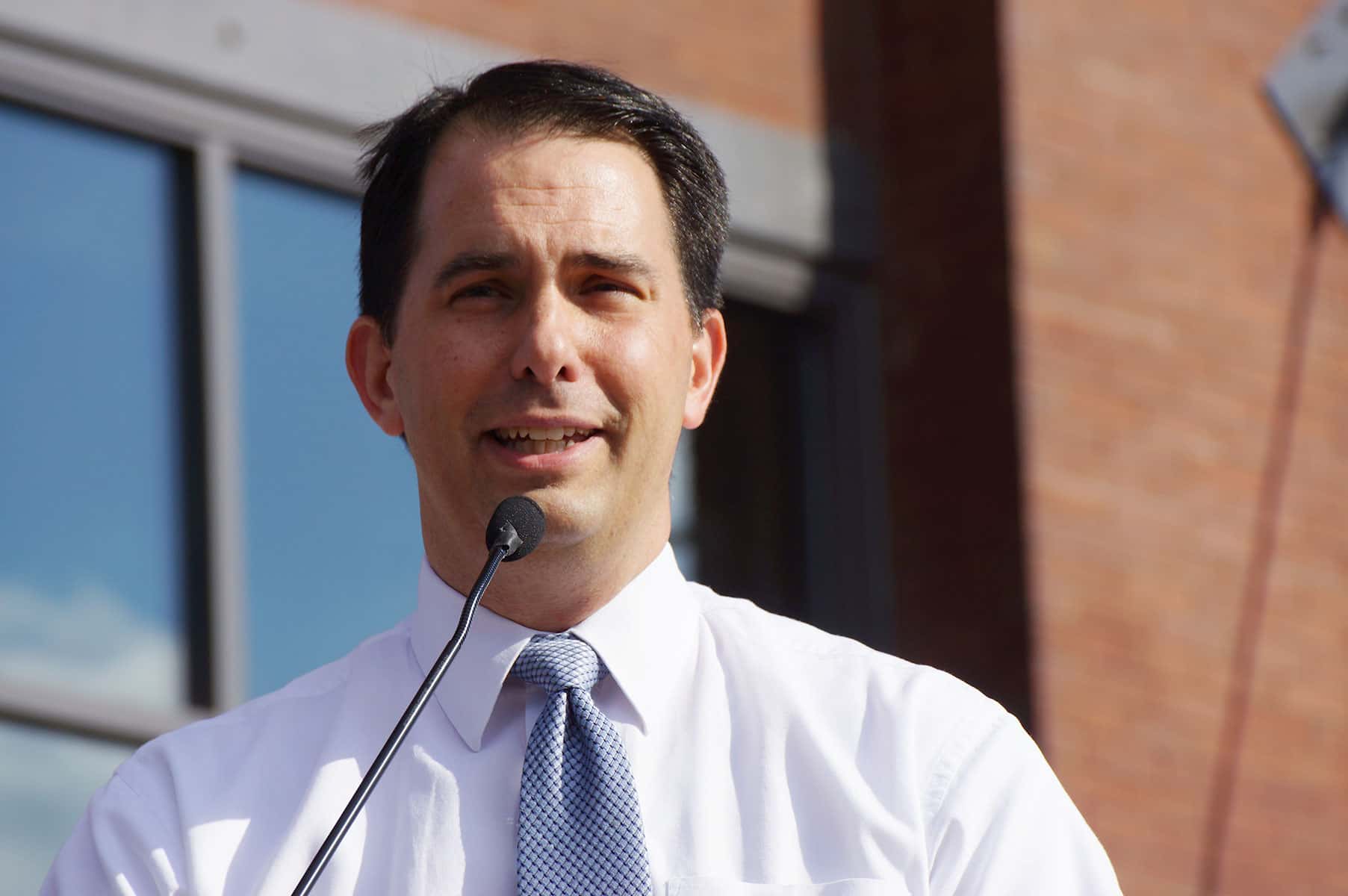
In the five years since Scott Walker’s election in 2010, he has destroyed a century of progressive laws and policies, some dating back to the great reformer himself, Fighting Bob La Follette. This blog will show what he’s done, how he did it, and how his vandalism can be undone.
There is a difference between a conservative and a vandal. In its most extreme form, which we see at work elsewhere today, vandalism can involve the destruction of artistic and architectural treasures thousands of years old. The psychology of a vandal includes self-hatred for his own lack of accomplishment, finding nihilistic beauty in destruction, and a strong urge to destroy the accomplishments of others because a vandal is incapable of accomplishment.
The following are five of the many acts of vandalism that Walker has inflicted on Wisconsin with no advance mandate or even discussion during campaigns. These are (a) the attack on the University of Wisconsin; (b) the attack on labor unions; (c) the attack on open records and disclosure; (d) the attack on civil service; and (e) the attack on environmental protections.
The New York Times published an excellent article on January 16 entitled “The Destruction of Progressive Wisconsin,” outlining in some detail what Governor Scott Walker has done to dismantle a century of Wisconsin accomplishments that made us one of the best states in the country to live and work. I want to describe what he has done, how he’s managed to do it, and what’s necessary to restore what he’s destroyed. He has injected corruption – absent for a century — back into Wisconsin government.
WHAT HE’S DONE
In just five years, Scott Walker has done the following:
Eviscerated labor unions.
Walker started in his first term by destroying public employee unions. When he ran for reelection in 2014, he promised the handful of unions who supported him that he would not sign a right-to-work law. As soon as he was elected, he pushed through and signed a right-to-work law. In an editorial on September 15, The Milwaukee Journal Sentinel said: “He can’t be trusted. Just ask the handful of unions who supported him during his runs for governor.”
Seriously weakened environmental protections.
In July, Walker eliminated a third of the Department of Natural Resources staff scientists, who had conducted research on climate change, wildlife management and pollution from a proposed iron ore mine.
Eliminated Civil Service Protections.
In 1905, under the leadership of fighting Bob La Follette, Wisconsin became the third state to enact civil service reform. Scott Walker reversed that accomplishment, replacing anonymous exams with resumes, and opening the door to political bias and corruption. Personal files are not part of a public record, and it will be difficult to get to the bottom of what he does.
Poised to Eliminate Certain Open Records and Disclosure Laws.
Walker and Republican speaker Robin Vos have tried to push through changes to open records and disclosure laws in Wisconsin that will make it difficult to uncover corruption in state government. In the face of publicity by The Milwaukee Journal and others, Walker and Vos have momentarily suspended some of their proposed legislation in this area. But their tactics are and were to push through the controversial proposals with little notice, no opportunity for comment, and quick votes which are impossible to undo once they are taken. The Milwaukee Journal, in addition to saying that Walker can’t be trusted, publicized the procedures for running against Robin Vos in a primary, and suggested that people in his district consider doing so.
Eliminated Statutory Tenure in the University of Wisconsin.
Walker has launched an attack on the University of Wisconsin that can only be described as vandalism. He initially tried to change the mission statement of the university to make it in effect a job training arm of Wisconsin business. He had to back off in the face of universal outrage. He then pushed through legislation to eliminate statutory tenure in the University of Wisconsin system. What remains is so-called “fake tenure” which is subject to the will of the Regents.
Tenure had been a strong factor in creating a university that is continually ranked among the top 50 in the world. Unlike Walker’s very deep cuts to funding for the University of Wisconsin, which also hurt the university, there was absolutely no financial benefit to undermining tenure and changing the mission statement.
The average person doesn’t fully understand how tampering with tenure has and will continue to injure the university. As new Regents are appointed to reflect Walker’s intellectually impoverished world view, you will find that conservative academics will be increasingly retained, and more independent academics will be dismissed. In the future, this could include historians who are deemed to have an “incorrect” view of history, scientists who want to engage in stem cell research, as well as a broad range of other scholars in English, philosophy, and the social sciences. The best faculty will no longer choose to come to the University of Wisconsin, and some have already left.
Yale University, a private university, encountered something like this from another direction. A conservative billionaire alumnus offered to make an extraordinarily substantial endowment for a curriculum involving the teaching of European history and culture, but demanded that he be permitted a voice in selecting the faculty. Yale turned him down.
In the future, if Walker stays in power, you will find Regents further revising fake tenure to cleanse perceived intellectual deviates. Our state, which is of average size, population, and wealth, will no longer have one of the greatest universities in the world.
HOW DID THEY DO IT?
One thing that had puzzled me among all these destructive actions was the attack on the University of Wisconsin. Walker went into office with strong support from the Wisconsin business community. Putting aside all of the other issues that I’ve listed, the University of Wisconsin has strong support in the Wisconsin business community. There are a number of prominent businessmen I know who are proud of their UW alma mater and have given a lot of money to it. The spirit among UW alumni is similar to the Green Bay Packer spirit. We not only support the UW athletic teams, but are also proud of the excellence of the faculty, the excellence of the student body, and the fact that a relatively small state like Wisconsin has created a university that has ranked in the top 50 in the world for many years. How could responsible and decent businessmen, some of whom I know personally, have permitted all of this to happen without speaking privately to Walker and telling him to knock it off?
What I discovered was disturbing. A number of Wisconsin businessmen, supporters of Scott Walker, did speak to him privately. They did tell him that the University of Wisconsin in particular was off-limits to this kind of tampering, and he should stop it.
But Walker has ignored his Wisconsin business supporters, even on the issue of the University of Wisconsin, because he has acquired wealthier patrons. There are out-of-state billionaires who have meddled in Wisconsin government, including but not limited to the Koch brothers, who are far wealthier and far more powerful than the people who got Walker elected in the first place. I was reminded of the song in Evita: “Goodbye and thank you Magaldi.” When Wisconsin businessmen went to Walker to say “knock off the tampering with the University of Wisconsin,” it was too late. He had gone on to be the consort of wealthier men.
It next occurred to me that there have got to be some decent Republicans in the legislature who could put an end to this. There must be at least a handful of Republican state senators who would be bothered by a right-to-work law, bothered by an attack on the University of Wisconsin, and bothered by an attack on Wisconsin’s environment. Surely they could vote against it and stop it.
I think it’s fair to say that many people look at the average Republican legislator as an individual who stumbles into his office burping and yawning at 10 in the morning, his wide stubby tie barely extending over the middle of his Sheboygan tumor, reaching for the handout of how he is supposed to vote. But there are some Republican legislators who don’t fit this description. There are a handful who would like to vote in good faith. They oppose right-to-work, support the University of Wisconsin, and oppose the weakening of environmental regulations. So why didn’t they stand up?
Here’s the reason. The Republican leadership, and more importantly its wealthiest donor base, looks on the Republican electorate as a mob easily controlled, easily whipped into a frenzy, advancing by torchlight, with the moonlight glinting off the tines of the pitchforks, illuminating the occasional tooth. The gerrymandering of the districts is so tight that they can threaten a primary against anybody who shows the slightest independence.
This has actually happened. There is at least one state senator who had determined not to betray Wisconsin on one of these issues, and he received a visit and a message. Either vote as he was supposed to, or he would face a primary that he would lose because he had no money. He would lose his salary, and the right to refer to himself as “senator”. In short, if he voted his conscience, he would be stripped of his prestige and income. He succumbed.
THE SOLUTION
So what should we do about all this? The gerrymandering is so tight that no relief is possible in this legislature. So long as Republican voters act as the rabble that the donor class think they are, we’ll have another 15 years of further destruction of Wisconsin’s culture.
But there is one district that can’t be gerrymandered, and that’s the entire state of Wisconsin. The only solution to stopping this is to elect a Democratic governor in 2018. When the legislature is reapportioned in 2020, a Democratic governor would veto the Republican plan. That would put it in court, where a judge usually appoints a special master with expertise in redistricting. What’s liable to result will be a judicially prepared reapportionment plan that makes all districts more competitive. Given the present mood of the country, I believe that with competitive districts, certainly the State Senate and very possibly the Assembly would turn Democratic. These legislators, in turn, can repeal right-to-work, restore collective bargaining for public employees, reinstate environmental regulations, restore statutory tenure and funding to the University of Wisconsin, restore Civil Service protections, and reinstate the culture of clean, open government that we enjoyed before 2010.
But the question, of course, is who will run for governor. It’s important to understand, that at present there is no one of stature who is even rumored to want to run for the position. Governor Walker’s approval is down under 40%, and if he runs again, he could be beaten. The Lieutenant Governor, Rebecca Kleefisch, would not be a strong candidate for governor. While Robin Vos, the speaker, might think of it, he is widely disliked by all Democrats, many independents, and a surprisingly large number of Republicans. People will vote for many things, but they don’t vote for people they don’t like. And they don’t like vandals. So this is a call to the Wisconsin Democratic Party to start identifying and supporting a strong candidate to run for governor in 2018. It can’t wait until after the presidential election in November of 2016.
Matt Flynn
Republished with permission from www.mattflynnwriter.com














